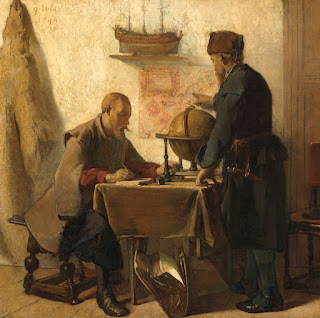1. to explain, instruct, mean, translate / meaning
1a) verb: BITHJOD-, BITHJUD-, BITHUT-, BITJOT-, BITJVD-, BITJVT-, BITJVTH-: 'to explain, mean, instruct' (fragments 2f, 13f, 13g-1, 13g-2, 16f)
1b) noun derived from it: BITHJUTNESSE, BITJVDNESE, BITJVTENISE: 'meaning' (fragments 4f, 6, 15e)
Some cognates:
verb:
(be)duiden - Dutch (point to, refer to, suggest, explain, clarify/ signify, indicate, signal, foreshadow)
(be)deuten - German (mean, imply etc./ interpret, point at)
ge-ðiodan - Od English (i.e. 'translate')
þýða - Old Norse
noun:
(Be)deutung - German (interpretation, analysis/ meaning, sense, meaning, significance, importance)
duiding - Dutch (the act of providing meaning or context to help others understand)
adjective:
duidelijk - Dutch (clear, precise, obvious)
deutlich - German (articulate, clear, distinct, considerable)
=== Fragments in Codex Oera Linda ===
2f. Frya’s Tex
[013/15]
HJRA DVMHÉD BITJVTHA
explain her folly
4f. Minerva
[035/01]
THJU BITJVTENISE FON THI NACHT.ULE
the meaning of the night owl
6. Yule, Script, Numbers
[045/25]
THJU BITJVDNESE
its meaning
13f. Primal Teachings 2
[101/25]
BITHJUTA ÀND BIWISA MÜGE
explain and demonstrate
13g. The Unsociable Man
[105/01]
BITHJUDE HIU HIRA BERN
she instructed her children
[106/01]
BITHJOD THÀN JVWE NÉSTA
Instruct your neighbors
15e. Gosa’s Will
[142/20]
THA BITHJUTNESSE LÉRA
teach the meaning
16f. Liudgeart: Panj-ab Report
[165/30]
THET HINDNE BITJOTH
which means ‘hinds’ (deer).
 |
| Chuds and other ethnic groups in 9th century Eastern Europe |
2. (foreign) people, populace, folk
noun: TJVTH, TJOTH, THJUD, THJOTH: 'people, populace, folk' (note: in OL always used referring to foreign people)
Related: Dutch, Diets, Deutsch ('German'), Teuton.
=== Fragments in Codex Oera Linda ===
4g. Crete
[039/20]
THA FORSTA ÀND PRESTERA KÉMON BÁRJA THÀT WI HJARA TJVTH OVERHÉRICH MAKAD HÉDE ÀND THÀT FOLK KÉM TO VS VMBE HUL ÀND SKUL.
The princes and priests came and charged that we had made their people [i.e. Cretans] unruly, and the folk came to us for aid and protection.
8a. Magyars and Finns
[052/20]
ÀND HJARA TJOTH HILDON HJA IMMERTHE BINNA THA PÉLON. MEN THAT VRSKALKTON VSA WÁKENDOM.
And they [i.e. the Magyars] always kept their populace [i.e. the Finns] within their boundaries. But that made us complacent.
13d. Ode to Adela
[097/10]
THA FÉRHÉMANDA HÉRA KÉMON HJARA THJUD ASKJA. THÁ HJA SAGON HO SKOTS HJA MISDÉN WÉRON KÉM TORN VP.
Their foreign masters came to look for them [lit.: 'for their people', i.e. three Phoenician sailors] and, seeing how they had been humiliated, became furious.
13i. Apollania’s Journey
[113/05]
DVATH HJA ALSA. [10] SÁ SKILUN THA WICHANDLIKA KNÁPA TO VS KVMA. HJA SKILUN WISER WÀRTHA ÀND RIKKAR. ÀND WI NE SKILUN NÉN BIHOF LONGER NAVT NÀVE AN THÀT WLA THJUD.
If they do so, the boldest young men will come to us. They shall become wiser and richer, and we shall no longer have need of those useless types [lit.: 'that foul/vile folk'].
19f. Askar’s Failure
[209/05]
THA [10] FOLKAR THAM AN HIM PÁLADON. HÉTON HJARA SELVA THJOTH.HIS SVNA THAT IS FOLK.HIS SVNA.
The peoples closest to him called themselves‘Thioth’s Sons’ (Teutons) — that is ‘folk’s sons’.
 |
| see below |
3. wicked, exotic, alien, strange ('of foreign people'?)
3a) adjective in compound noun: TSJOD.IS.HÉD (fragment 16e): 'wickedness'
3b) adjective in seemingly negative context: THJVD, TJODA (fragments 1b, 19c, 19d): 'exotic', 'alien', 'strange' ('of the foreign people', 'unwelcome here'?)
(Probably) related: Frisian 'tsjoed', Sami tshudde or čuđđe, Tschuden, Chuds. See notes below.
=== Fragments in Codex Oera Linda ===
1b. Adela’s Advice
[002/15]
THÉR HÉRDON HJA MITH LUSTUM NÉI THA VRDWÁLSKA [20] FINNA SÁGUM. THRVCHDAM HJA THJVD ÀND NÉI WÉRON. SÁ SEND HJA VNT.FRYA.ST VNTHÔNKES THENE WALD HJARAR ALDRUM. (the manuscript has twice ÀND after THJVD, which I think is a more common copyist error. Overwijn read this as THJVDAND ÀND NÉI. Menckens also read 'thjudänd' as one word.)
There, they listened eagerly to the outrageous sagas of the Finns, because they were exotic and new. This is how, despite the authority of their parents, they lost their Fryas identity.
16e. Gosa: Purity of Language
[159/15]
IN HJARA TSJOD.IS.HÉD SEND HJA TO GVNGEN ÀND HÀVON ÔTHERA TÁLA FORSVNNEN
TILTHJU HJA HÉMLIK MACHTE SPRÉKA IN [20] ÀJENWARTHA FON ALREK ÔTHERUM. VR ALLE BOSA THINGA ÀND VR ALLE VNWÉRTHLIKA THINGA SVNDER THÀT STEMLÉTH HJAM VRRÉDA MOCHT NACH SKÁMRÁD HJARA GELÁT VRDERVA.
In their wickedness, they went about inventing different languages, so as to speak secretly in the presence of others about all evil things and about all unworthy things without a stammer betraying them or a blush tainting their visage.
19c. Reintia’s Dream
[204/20]
BY THA TWISK.LANDAR SEND FÉLO TJODA PLÉGA FON THA TARTARUM ÀND MAGJARA BINNA GLUPTH MEN ÁK FÜL SEND [25] THÉR FON VSA SÉDUM BILÉWEN.
THÉR THRVCH HÀVATH HJA JETA FÁMNA THÉR THA BERN LÉRA ÀND THA ALDA RÉD JEVA.
Among the Twisklander, many alien habits had crept in from the Tartars and Magyars, but many of our customs remained. Hence, they still have maidens who teach the children and advise the old.
19d. Askar Lost to Idolatry
[205/15]
FRÉTHO.GUNSTA KÉM EN JÉR LÉTER TO STÁVEREN. BI HJARA FOLGAR WÉRE ÁK ÉNEN MÁGÍ HWAND THA JUTTAR WÉRON [15] SUNT LÔNG VRBRUD. KIRT AFTER THÀT ÁSKAR MITH FRÉTHO.GUNSTA BOSTIGJATH WAS WÀRTH THÉR TO STÁVEREN ÉNE SCHERKE BVWED. INNA THJU SCHERKE WRDON TJODA DROCHTEN LÍKANDA BYLDON [20] STALTH. MITH GOLD TRVCH WROCHTNE KLÁTHAR.
ÁK IS ER BIWÉRATH THAT ÁSKAR THÉR NACHTIS ÀND VNTÍDIS MITH FRÉTHO.GUNSTA FÁR NITHER BUWGADE.
Frethogunsta came to Staveren one year later. Among her followers was a magus, for the Jutters had long been corrupted. Shortly after the marriage of Askar and Frethogunsta, a temple was built at Staveren, in which strange idols were placed, clothed in garments embroidered with gold. There were rumors that Askar would bow down to them with Frethogunsta at night and at ungodly times.
| fragment |
Ott 2023 |
Menckens 2013 |
Jensma 2004 |
Overwijn 1951 |
Wirth 1933 |
Sandbach 1876 |
Ottema 1876 |
| 1b | exotic |
volksnah |
slecht |
dubbelzinnig |
deutungsvoll |
bad |
geestig (1872: slecht) |
| 16e | wickedness |
Verschlagenheit |
slechtheid |
zigeunerachtigheid |
Schlechtigkeit |
wickedness |
ondeugendheid |
| 19c | alien |
Volks- |
slechte |
Zigeuner- |
übele |
bad | kwade |
| 19d | strange |
volkliche |
kwade |
Magiaanse |
üble |
( - ) |
boze |
 |
| 'tsjoed' in 'Friesch Woorden- boek' Dijkstra & Buitenrust Hettema A-H (1896) |
Notes:
- 'Tsjoed' in (modern) Frisian means 'wrong', 'bad', 'evil'.
- On the Tschuden/Chuds wiki: (German): "Die mündliche Überlieferung der Samen und nördlichen Karelier ist reich an Geschichten über als Tschuden bezeichnete Räuber und Feinde" (translated: "Oral tradition of the Sami and northern Karelians abounds with stories of robbers and enemies known as Chuds") // (English): "another hypothesis contends that it is derived from the Sami word tshudde or čuđđe, meaning an enemy or adversary"
- THJONSTER is 'sorceress' and THJUSTER(NESSE) is 'dark(ness)', mostly used in negative context.
- Overwijn (1941, pp. xxxviii-ix) refers to Tsjoedi/Tsjoegi/Tsoegi => tsigoe, tsigeu => Tsigane, Tsigoin, Zigeun(er); i.e. 'gypsy'. Overwijn (1951, p. 90c) "de verzamelnaam voor Finnen, Letten, Esthen en Lappen in het Russisch is: Tsjoedskïï" van "Tsjodis of Tsjoedis".
===
If 2) means 'foreign people' (in a negative sense: unwelcome here), 3) could originally mean 'of the foreign people' in short 'foreign' or 'strange', but in a negative sense: 'alien'.
I think 'Tschuden' can be explained from the Fryas word. But I don't see a clear link between 1) and 2)/3) yet.










